Alabama Republican Party leaders support Tommy Tuberville’s abortion stance
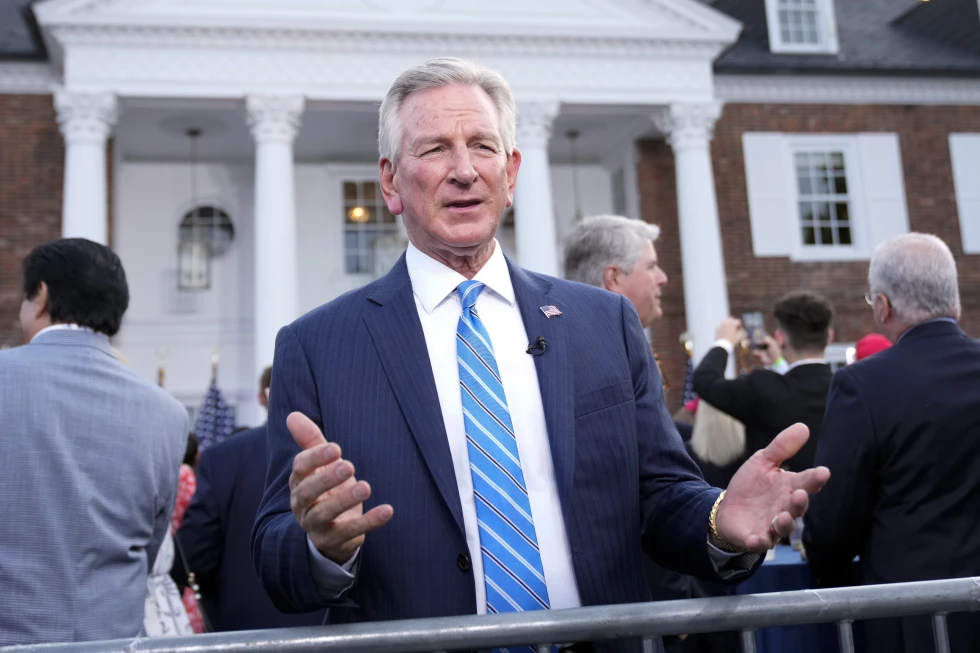
On Saturday, the Alabama Republican Party State Executive Committee passed a resolution reprimanding President Joe Biden for his circumventing the Hyde Amendment and using taxpayer money to fund abortion-related expenses for service members and their dependents. The resolution also supported Senator Tommy Tuberville for his stance in standing up to the Biden Administration’s policy. Tuberville has been widely criticized by the mainstream media, Senate Democrats, and the Whitehouse, including by President Biden himself, for his refusal to give unanimous consent to military and Department of Defense promotions until the policy is reversed. “The Senator from Alabama’s actions are not just the usual back and forth in Washington. His holds pose a grave threat to our national security and our military readiness,” said Sen. Elizabeth Warren (D-Massachusetts). “Sen. Tuberville’s hold is just another indication of the madness that seems to have seized extremists in the Republican Party.” President Biden has called Tuberville’s position “ridiculous” and “bizarre.” However, 99.1% of his party colleagues in Alabama, from all 67 counties, voted to support Tuberville’s stance, a move that has stalled 360 military promotions, including that of the Commandant of the Marine Corps and the Chairman of the Joint Chiefs of Staff. The resolution reads: “Reprimand of the Biden Administration for Violating the Principles of the Hyde Amendment WHEREAS, The Hyde Amendment was enacted as part of the federal budget in 2022 and bars the use of federal funds to support abortions at any level, and WHEREAS, The Biden administration has gone against the principles of the Hyde Amendment by ordering the use of federal funds to pay for <me off from work and travel costs to obtain abortions for both service members and their dependents, and WHEREAS, A Marist poll sponsored by the Knights of Columbus earlier this year showed 60% of all American adults oppose the use of taxpayer money to fund abortion related expenses, and WHEREAS, U.S. Senator Tommy Tuberville has stood strong against the actions of the Biden administration. THEREFORE, BE IT RESOLVED that the Alabama Republican Party calls on the Biden Administration to reverse the policy of using taxpayer money to fund abortion related expenses against the will of the people, and thanks Senator Tommy Tuberville for his stand against this flawed policy. This resolution adopted by the Alabama Republican Executive Committee on this the 5th day of August, 2023, in session at Montgomery, Alabama.” The 475-member Republican State Executive Committee meets at least two times a year to elect officers, pass resolutions such as this, and consider bylaws changes. Tuberville spoke to the group on Friday night when he introduced former President Donald Trump. To connect with the author of this story or to comment, email brandonmreporter@gmail.com.
Democrats may change Senate rules over Tommy Tuberville’s hold on promotions
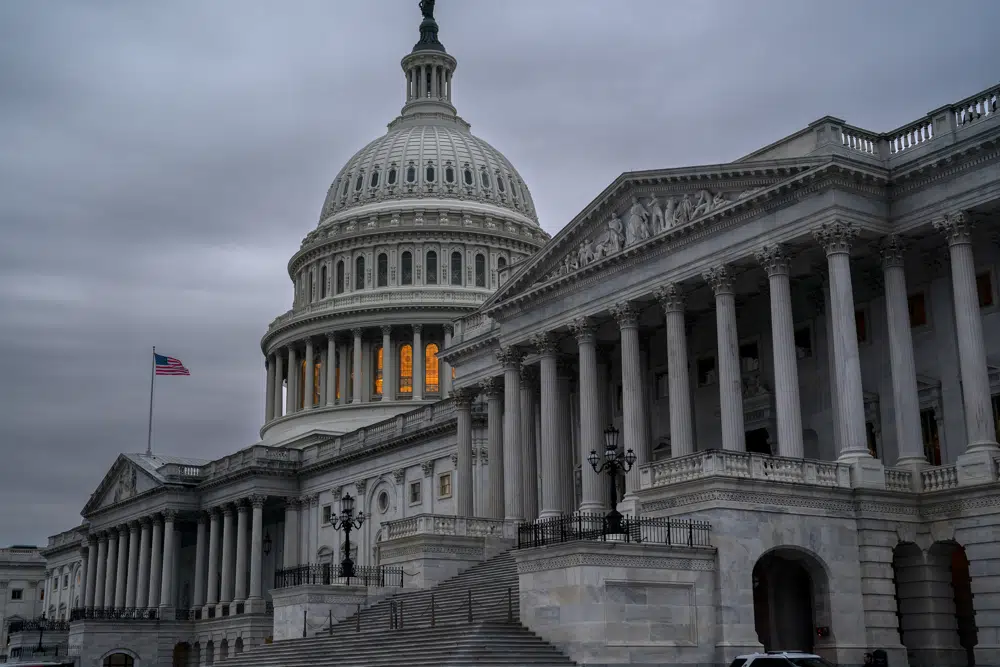
The Hill’s Alexander Bolton reported on Tuesday that Senate Democrats may look at rules changes to break through the blockade U.S. Senator Tommy Tuberville has put in place against more than 200 military promotions to protest the Pentagon’s abortion policy. Democrats accuse Tuberville of abusing the Senate rules by keeping his hold on Joe Biden’s military promotions in place since February. “We need to talk about changing rules that Republicans have learned to exploit. We can’t continue in a world where one senator puts our entire national defense at risk because he doesn’t like one policy followed by the Department of Defense,” said Sen. Elizabeth Warren (D-Massachusetts), a member of the Senate Armed Services Committee. Warren says that she has repeatedly asked for unanimous consent to advance Biden’s nonpolitical military promotions only to be blocked by Tuberville. “Sen. Tuberville’s hold is just another indication of the madness that seems to have seized extremists in the Republican Party,” she said. “I don’t think one person should be able to hold up the promotions and lives of everybody in the military or any other part of government,” said Sen. Debbie Stabenow (D-Michigan), the chairwoman of the Senate Democratic Policy and Communications Committee. “The Senator from Alabama’s actions are not just the usual back and forth in Washington. His holds pose a grave threat to our national security and our military readiness,” Warren said in a floor speech on June 1. “They actively hurt our ability to respond quickly to threats worldwide. That is not my conclusion. That is the conclusion of the Secretary of Defense.” President Joe Biden brought up Sen. Tuberville’s hold on military promotions without mentioning the Senator by name in comments at an event on Monday. “Because the military said if you’re in the military and you’re having a troubled pregnancy, and you’re in a state where you’re not allowed to see the doctor performing any remedial operation on you, then you can get paid – you can have leave to go to where you can do that,” Biden said. “I know I don’t look like I’ve been around, but I’ve been around a long time. There’s so many things of consequence that we can solve. And the vast majority of people, all the data shows, support the positions we’re generically taken.” On Thursday, Tuberville said that he is not backing down. “This is the ninth time that Democrats have come to the floor to try to break my hold on the Department of Defense’s nominees,” said Tuberville. “This is the ninth time that I’ve come to the floor to keep my word. Since the last time we did this, nothing has changed. And so, my hold will remain in place.” Tuberville continued, “Yesterday, the White House Press Secretary was asked why they haven’t reached out to me at all. She said, “I do not know when the last time is they talked to the senator.” I’ll tell you when the last time was — never. The White House has not reached out once in four months. No one has contacted me. There has not been one conversation, no path forward. I have spoken to Secretary (Lloyd) Austin, outside of Armed Services hearings, exactly once in the last two years. That was a 10-minute phone call — three months ago. He made absolutely no effort to find a compromise in our situation.” “Many of the claims made about me have been completely false. Many of them,” said Tuberville. “This is no way to negotiate with a colleague — especially in this body, the United States Senate. Frankly, this kind of behavior from the Democrats just steels my resolve. The more false claims the Democrats make about me, the more inclined I am to keep the holds in place.” “But I would note that just yesterday, a news story reported correctly that these military positions are being fulfilled by acting officials,” stated Tuberville. “These jobs are being done right now. They’re not empty. Four months into this situation that is obvious that people are doing the job. It is not affecting readiness. Anyone who says otherwise is wrong.” “I will keep my hold until the Pentagon follows the law [or] Congress changes the law,” vowed Tuberville. “That’s the way we do it here in the Senate. A ‘show vote’ in committee is not good enough. We can do that all we want. It’s not going to make any difference. An amendment that gets stripped out on the floor by Senator [Chuck] Schumer is not good enough. What I have said from the beginning: either follow the law or change it. Follow the law that we have made in this body, or change the law.” It is far from certain that Democrats have the votes to change the Senate rules, as any proposed rule change on this would dramatically decrease the power of every individual senator – of both parties. This slowdown of routine Senate business could be getting worse. Sen. JD Vance (R-Ohio) is following Tuberville’s example when he declared last week that he will put a hold on all nominees to the Justice Department over the prosecution of former President Donald Trump. “Donald Trump is merely the latest victim of a Department of Justice that cares more about politics than law enforcement,” Vance said in a statement. “Merrick Garland’s department harasses Christians for pro-life advocacy but allows hardened criminals to walk our streets unpunished. This must stop, and I will do everything in my ability to ensure it does. Starting today, I will hold all Department of Justice nominations. If Merrick Garland wants to use these officials to harass Joe Biden’s political opponents, we will grind his department to a halt.” To connect with the author of this story or to comment, email brandonmreporter@gmail.com.
Katie Britt and Senate colleagues introduce a bipartisan bill to cut compensations from failed bank executives

U.S. Senator Katie Britt on Friday joined Senator J.D. Vance (R-Ohio), Senator Elizabeth Warren (D-Massachusetts), and a bipartisan group of colleagues in introducing the Failed Bank Executives Clawback Act. This legislation would enable federal regulators to claw back compensation from bank executives who are responsible for the reckless decisions that resulted in their institution’s failures. “When executives drive financial institutions into failure with reckless business practices, they shouldn’t be allowed to use their golden parachutes to escape responsibility while their customers, their employees, and hardworking American families are left footing the bill for the failure of their bank,” said Sen. Britt. “This commonsense legislation will dissuade risky bank mismanagement and ensure that bad actors are held accountable.” “The executives responsible for running their banks into the ground are sitting on millions of dollars in compensation and bonuses. Meanwhile, the American people are bearing the financial burden for their excessive risk-taking and gross mismanagement,” said Sen. Vance. “This legislation would right that wrong and ensure that failed bank executives are held accountable for the collapse of their institutions – not the American taxpayer.” “Nearly three months after the collapse of Silicon Valley Bank, a bipartisan group of Senators is demonstrating a serious commitment to pass legislation requiring financial regulators to claw back pay from executives when they implode their bank,” said Sen. Warren. “Congress must answer the President’s call for stronger laws to hold failed bank executives accountable, and I’m determined to work with lawmakers on both sides of the aisle in the Senate Banking, Housing, and Urban Affairs Committee to deliver change.” The bill would expand the existing authority of the Federal Deposit Insurance Corporation (FDIC) to claw back the compensation of bank executives when they are found to have substantially contributed to the collapse of a financial institution by engaging in reckless business practices. Any funding that is clawed back will be directed to the FDIC’s Deposit Insurance Fund. This legislation was introduced in light of the recent collapses of Silicon Valley Bank (SVB) in California and Signature Bank in New York. Sponsors claim that considering the cost of the institutions’ collapse to the FDIC’s Deposit Insurance Fund and impact to the broader banking sector, this legislation is needed to deter future bad actors. Sen. Britt questioned former SVB CEO Greg Becker at a recent Banking Committee hearing, demanding answers about his responsibility in the bank’s collapse and his plans to give back the $1.5 million bonus he received. “If the team would have known it was going to be the fastest rate in history, I believe they would have considered different decisions,” Becker testified. “Senator, I was the CEO of Silicon Valley Bank. I take responsibility for what ultimately happened.” Co-sponsors of the bill also include U.S. Senators Bob Menendez (D-New Jersey), Mark Warner (D-Virginia), Kevin Cramer (R-North Dakota), Chris Van Hollen (D-Maryland), Tina Smith (D-Minnesota), Raphael Warnock (D-Georgia), John Fetterman (D-Pennsylvania.), Catherine Cortez Masto (D-Nevada), Josh Hawley (R-Missouri.), and Mike Braun (R-Indiana). To connect with the author of this story or to comment, email brandonmreporter@gmail.com.
Mitch McConnell opposes Alabama Republican’s blockade of military nominees over Pentagon abortion policy
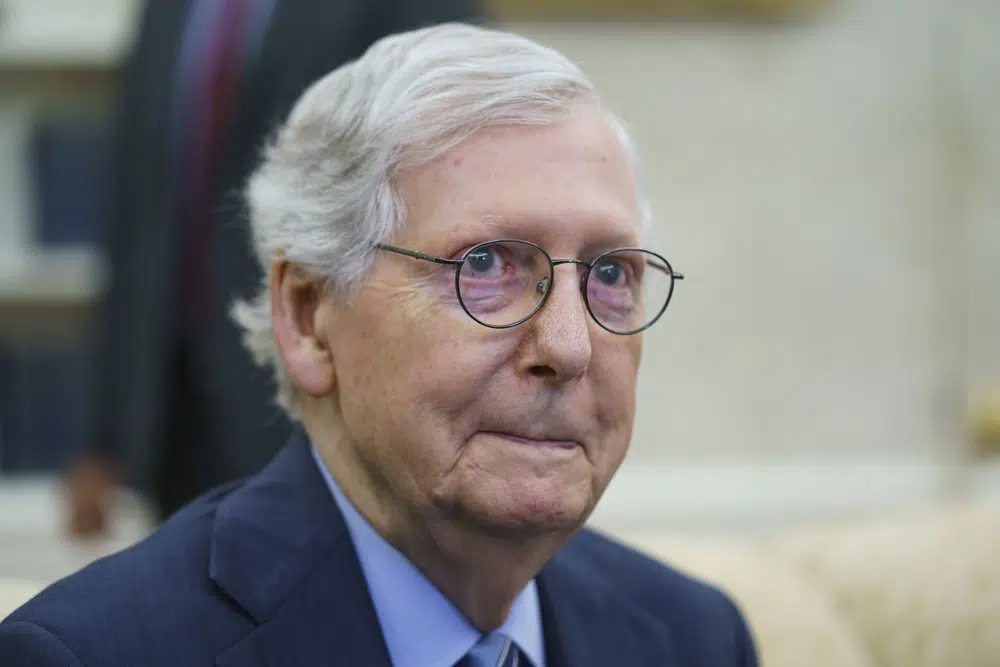
Senate Republican Leader Mitch McConnell said Wednesday that he won’t support a fellow GOP senator’s blockade of military nominees, backing Democrats and Defense Secretary Lloyd Austin, who have said that the holdup is harming national security. Alabama Sen. Tommy Tuberville is objecting to the normally routine practice of confirming dozens of military nominations, a move that would force the Senate to hold potentially hundreds of votes to confirm non-controversial senior military officers. Tuberville has not backed down from his now-monthslong pledge to hold up the nominees over the Pentagon’s abortion policy, which provides travel funds and support for troops and dependents who seek abortions but are based in states where they are now illegal. “No, I don’t support putting a hold on military nominations,” McConnell told reporters, in response to a question about Tuberville’s blockade. “I don’t support that. But as to why, you’ll have to ask Sen. Tuberville.” McConnell’s comments have no practical effect on Tuberville’s holds because any senator can hold up any Senate action. But the GOP leader’s position further isolates the Alabama Republican as lawmakers and national security officials have said that the holdup may have dangerous effects. In a letter sent last week to Massachusetts Sen. Elizabeth Warren, a Democrat, Austin wrote that he has “deep concern” about the delays in confirmations. He said the Pentagon estimates that approximately 650 officers covered by the hold – those at the one-star to four-star levels – will require Senate confirmation between now and the end of the year. The delays pose “a clear risk to U.S. military readiness, especially at his critical time,” Austin wrote, adding that never before has one senator held up so many officers. The glut of vacancies would break down the department’s normal flow of leadership and breed uncertainty and confusion, he said, risking operations in “every theater, every domain, and every service.” At a hearing earlier this year, Austin defended the abortion policy by saying that tens of thousands of women in the military live and work in locations that don’t have regular reproductive health care. “This policy is based on strong legal ground,” he said. A spokesman for Tuberville said Wednesday that McConnell’s comments have not changed his position. The senator has said repeatedly that he won’t budge. “Secretary Austin thought abortion is more important than his highest-level military nominations,” he said late last month after Democrats tried to call up the nominations on the Senate floor. “Secretary Austin could end the policy today, and I would lift my hold. Secretary Austin has chosen not to do that.” Tuberville has argued that Chuck Schumer can bring the nominations to the Senate floor at any time and hold individual votes. But each nomination would require at least two votes and days of Senate time, and Democrats have argued that it would set a dangerous precedent to hold partisan votes on routine military nominations that have traditionally been unanimously approved by voice vote. Schumer said on the Senate floor Wednesday that Republicans are willing to jeopardize U.S. “standing abroad, the livelihood of service members, and our military readiness” over the issue of abortion access. “Our national security is not a bargaining chip for radical right-wing policies,” Schumer said. Republished with the permission of The Associated Press.
Katie Britt and Tom Cotton lead bipartisan letter to Biden Administration about surge of Mexican steel

U.S. Senators Katie Britt and Tom Cotton, along with a bipartisan group of 11 of their Senate colleagues, sent a letter to Secretary of Commerce Gina Raimondo and U.S. Trade Representative Katherine Tai urging them to take action against the surge of Mexican steel imports, which they claim is unsustainable. The Sens. claim that the rising steel imports from Mexico raise grave concerns in America’s steel industry and steel communities such as those in Alabama. They also claim that this surge violates a 2019 agreement between the United States and Mexico negotiated by the Trump Administration. The letter contends that the United States deserves and should demand fair treatment from all trading partners, including its friends. “We urge the Biden administration to immediately begin consultations under the 2019 agreement to address this surge of Mexican steel and return imports to ‘historic volumes of trade,’ with quotas, if necessary,” the Senators wrote. “However, if the Mexican government refuses to remedy this breach, we regretfully urge the administration to consider other mechanisms to ensure compliance and protect American jobs, including the reapplication of Section 232 tariffs.” “The Administration has a responsibility to strongly enforce trade agreements to ensure fairness for hardworking Americans,” said Sen. Britt. “This unprecedented, unacceptable surge in Mexican steel imports is endangering good-paying Alabama jobs and negatively impacting communities across our nation. Additionally, our domestic iron and steel industry is critical for our national security. I will continue to fight to grow opportunities for families in every corner of Alabama and America, while keeping our homeland safe and strong.” Alabama still has a significant iron and steel industry. The iron and steel industry is an original economic engine for the state and supports approximately 15,000 jobs and indirectly supports more than 76,000 jobs, including subcontractors and suppliers. The average annual Alabama wage in the industry is nearly $100,000. Every two Alabama iron and steel industry jobs also supports ten additional jobs throughout the supply chain. Co-signing the letter are Senators Sherrod Brown (D-Ohio), John Boozman (R-Arkansas), Bob Casey (D-Pennsylvania), Thom Tillis (R-North Carolina), Tammy Baldwin (D-Wisconsin), Ted Budd (R-North Carolina), Elizabeth Warren (D-Massachusetts), Tina Smith (D-Minnesota), Rick Scott (R-Florida), Marco Rubio (R-Florida), and J.D. Vance (R-Ohio). The American Iron and Steel Institute (AISI) says that imports of finished steel increased by more than 18 percent in January compared with December. Mexico was the second-largest supplier (behind Canada) of finished and semi-finished steel to the U.S. in January. Mexico shipped 456,000 tons of steel to the U.S. in January – an increase of 10 percent from December. Britt is also a member of the National Security and International Trade and Finance Subcommittee of the Senate Committee on Banking, Housing, and Urban Affairs. To connect with the author of this story or to comment, email brandonmreporter@gmail.com.
Democrats kept the Senate this year, but 2024 may be harder
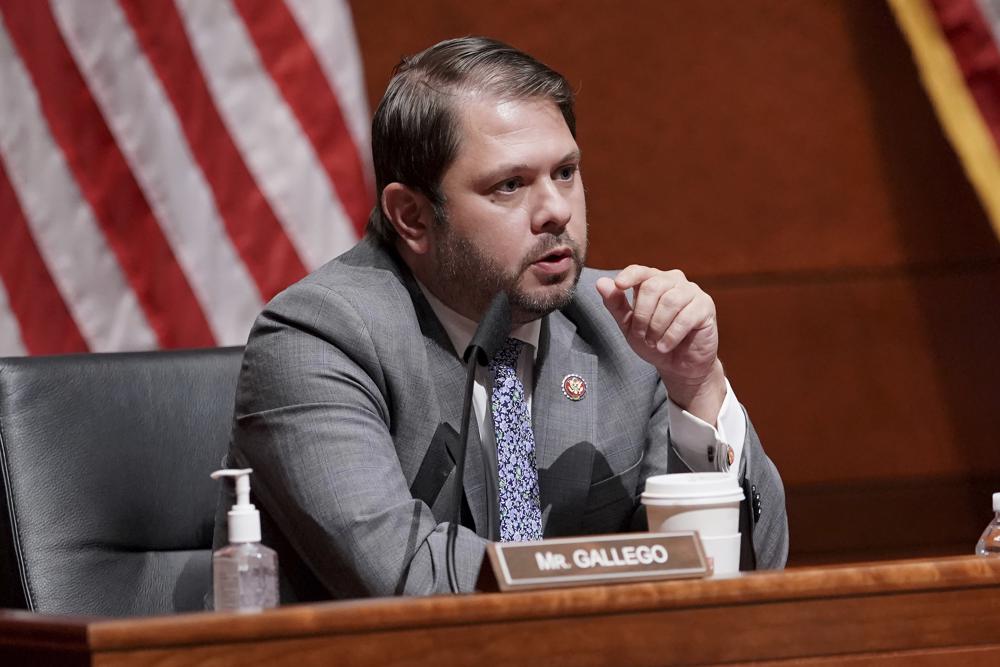
Democrats celebrating a successful effort to keep control of the U.S. Senate this year will soon confront a 2024 campaign that could prove more challenging. The party enters the next cycle defending 23 seats, including two held by independents who caucus with Democrats. That’s compared with just 10 seats that Republicans hope to keep in their column. Adding to the potential hurdles is that some 2024 contests are in states that have become increasingly hostile to Democrats, including Montana, Ohio, and West Virginia. Other Democratic-held seats are in some of the same hotly contested states that were at the center of this year’s midterms, such as Pennsylvania, Arizona, and Nevada. And while Democrats carried each of those races, they did so at great cost and with sometimes narrow margins. In Nevada, for instance, Democratic incumbent Sen. Catherine Cortez Masto won by less than 1 percentage point, or about 9,000 votes. For now, both parties insist they’re laser-focused on coming out on top in the December 6 Senate runoff in Georgia. But Democrats who are on the ballot in 2024 know that they could face fierce headwinds and are studying the results of this year’s election when the party outperformed expectations. For Nevada Sen. Jacky Rosen, a Democrat facing her first reelection campaign, that means staying focused on kitchen table issues and touting legislation like the infrastructure law and gun violence legislation signed by President Joe Biden. “We know that races are always close,” Rosen said in an interview. “We never take anything for granted.” The dynamics of the next Senate campaign could be influenced by a variety of outside factors, particularly the presidential election and the attention it generates. Biden, who turned 80 this month, has said his “intention” is to run for reelection and that he will make a final decision early next year. Former President Donald Trump has already announced a third White House bid, and multiple other Republicans are lining up to launch campaigns. The eventual nominee in each party could have a profound impact on down-ballot races, including those for Senate. But perhaps the biggest question for Senate Democrats seeking reelection will be who Republicans nominate as their opponents. The GOP lost several Senate elections this year, including those in Arizona, Pennsylvania, and Nevada, after Trump-backed candidates struggled to raise money and connect with a broader, more moderate range of voters during the general election. In Nevada, the Republican field to challenge Rosen has not begun to shape up but is expected to attract several contenders. One name receiving attention is Sam Brown, a former U.S. Army captain who was awarded a Purple Heart after being severely wounded in Afghanistan. Brown ran for Senate this year and put up a strong challenge in the Republican primary before losing to Adam Laxalt, who lost in the general election to Cortez Masto. Richard Hernandez, who was Brown’s campaign adviser, said, “He has committed to his supporters that he will never stop fighting for their issues, but he has not made any decisions as to whether that involves a future run for office.” Also in the southwest, Arizona Sen. Kyrsten Sinema, a centrist Democrat, will be up for reelection. The race, like other recent statewide contests in Arizona, is expected to be very competitive. But Sinema is likely to first face a well-funded primary challenger after angering much of the Democratic base by blocking or watering down progressive priorities like a minimum wage increase or Biden’s big social spending initiatives. She has not said whether she plans to run for reelection. Sinema’s most prominent potential primary challenger is U.S. Rep. Ruben Gallego, who has a long history of feuding with Sinema. Gallego has not announced his plans for 2024 but has made it no secret that he’s thinking about challenging Sinema. He even raised money on the prospect he might oppose Sinema. An independent expenditure group is also raising money, saying it will support grassroots organizations committed to defeating Sinema in a Democratic primary. Republicans hope a bruising Democratic primary might give them an opening to win the seat after losing Senate races in Arizona in three consecutive elections. Sinema is among a trio of moderate Senate Democrats who have sometimes used their leverage in an evenly divided chamber to block or blunt some of Biden’s plans and nominees. They will also be among the party’s most vulnerable incumbents in 2024. The other two senators, Joe Manchin of West Virginia and Jon Tester of Montana, will be running as Democrats in states that Trump handily carried in 2020. Manchin has already drawn a GOP challenger in U.S. Rep. Alex Mooney, who declared a week after winning reelection that he was setting his sights on higher office. Manchin has not yet said whether he’ll run for reelection. Republicans see Tester, a three-term senator, as vulnerable, and the opportunity to run for the seat could draw a fierce primary contest between former Interior Secretary Ryan Zinke and Rep. Matt Rosendale. Zinke, who won a House seat in this year’s midterm elections, said he will decide whether to run next year, and Rosendale declined to answer. Tester has not announced if he will seek another term but has said he anticipates 2024 will be just as tough as his last race in 2018, when he beat Rosendale in a close contest. In Pennsylvania, Democratic U.S. Sen. Bob Casey has not said whether he intends to run for a fourth term. Casey easily won reelection in 2018, but Pennsylvania has been competitive for Republicans, including in this year’s Senate race won by Democrat John Fetterman. One potential Republican challenger whose name has been floated in Pennsylvania is former hedge fund CEO David McCormick, who narrowly lost the Republican primary in this year’s race to celebrity heart surgeon Dr. Mehmet Oz. McCormick advisers declined to comment on that prospect. Conservative activist Kathy Barnette, who finished a close third in the Republican primary, didn’t respond to messages about whether she’s considering a 2024 campaign. Wisconsin, which saw Republican Sen. Ron Johnson narrowly win reelection this year, is also expected to have
Student loan forgiveness could help more than 40 million
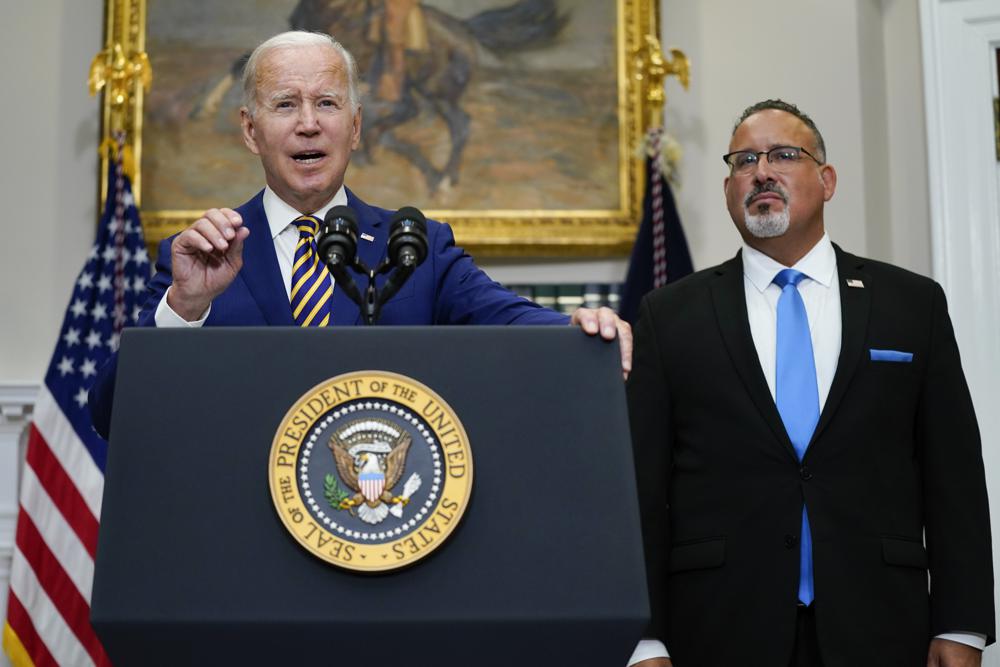
More than 40 million Americans could see their student loan debt reduced — and in many cases eliminated — under the long-awaited forgiveness plan President Joe Biden announced Wednesday, a historic but politically divisive move in the run-up to the midterm elections. Fulfilling a campaign promise, Biden is erasing $10,000 in federal student loan debt for those with incomes below $125,000 a year, or households that earn less than $250,000. He’s canceling an additional $10,000 for those who received federal Pell Grants to attend college. It’s seen as an unprecedented attempt to stem the tide of America’s rapidly rising student debt, but it doesn’t address the broader issue — the high cost of college. Republicans quickly denounced the plan as an insult to Americans who have repaid their debt and to those who didn’t attend college. Critics across the political spectrum also questioned whether Biden has authority for the move, and legal challenges are virtually certain. Biden also extended a pause on federal student loan payments for what he called the “final time.” The pause is now set to run through the end of the year, with repayments to restart in January. “Both of these targeted actions are for families who need it the most: working and middle-class people hit especially hard during the pandemic,” Biden said at the White House Wednesday afternoon. The cancellation applies to federal student loans used to attend undergraduate and graduate school, along with Parent Plus loans. Current college students qualify if their loans were issued before July 1. For dependent students, their parents’ household income must be below $250,000. Most people will need to apply for the relief. The Education Department has income data for a small share of borrowers, but the vast majority will need to prove their incomes through an application process. Officials said applications will be available before the end of the year. Biden’s plan makes 43 million borrowers eligible for some debt forgiveness, with 20 million who could get their debt erased entirely, according to the administration. About 60% of borrowers are recipients of federal Pell Grants, which are reserved for undergraduates with the most significant financial need, meaning more than half can get $20,000 in relief. Sabrina Cartan, a 29-year-old media strategist in New York City, is expecting her federal debt to get wiped out entirely. When she checked the balance Wednesday, it was $9,940. Cartan used the loans to attend Tufts University, and with Biden’s plan, she will be able to help her parents repay the additional thousands they borrowed for her education. As a first-generation college student, she called it a “leveling moment.” “I know there are people who feel that this isn’t enough, and that is true for a lot of people,” said Cartan, who already has repaid about $10,000 of her loans. “I can say for me personally, and for a lot of people, that is a lot of money.” For Braxton Simpson, Biden’s plan is a great first step, but it’s not enough. The 23-year-old MBA student at North Carolina Central University has more than $40,000 in student loans. As an undergraduate student, she took jobs to minimize her debt, but at $10,000 a semester, the costs piled up. As a Black woman, she felt higher education was a requirement to obtain a more stable financial future, even if that meant taking on large amounts of debt, she said. “In order for us to get out of a lot of the situations that have been systemically a part of our lives, we have to go to school,” Simpson said. “And so we end up in debt.” The plan doesn’t apply to future college students, but Biden is proposing a separate rule that would reduce monthly payments on federal student debt. The proposal would create a new payment plan requiring borrowers to pay no more than 5% of their earnings, down from 10% in similar existing plans. It would forgive any remaining balance after ten years, down from 20 years now. It would also raise the floor for repayments, meaning no one earning less than 225% of the federal poverty level would need to make monthly payments. As a regulation, it would not require congressional approval. But it can take more than a year to finalize. Biden’s plan comes after more than a year of deliberation, with the president facing strong lobbying from liberals who wanted sweeping debt forgiveness, and from moderates and conservatives who questioned its basic fairness. Once a popular campaign promise during the presidential primary, the issue created an almost unwinnable situation. Some fellow Democrats criticized the plan Wednesday, saying it’s too costly and does little to solve the debt crisis. “In my view, the administration should have further targeted the relief, and proposed a way to pay for this plan,” said Sen. Michael Bennet, D-Colo. “While immediate relief to families is important, one-time debt cancellation does not solve the underlying problem.” Still, many Democrats rallied around it, including support from those who wanted Biden to go beyond $10,000. “I will keep pushing for more because I think it’s the right thing to do,” said Sen. Elizabeth Warren, D-Mass., who had urged Biden to forgive up to $50,000 a person. “But we need to take a deep breath here and recognize what it means for the president of the United States to touch so many hard-working middle-class families so directly.” Proponents see cancellation as a matter of racial justice. Black students are more likely to take out federal student loans at higher amounts than their white peers. The NAACP, which pressed Biden to cancel at least $50,000 per person, said the plan is “one step closer” to lifting the burden of student debt. Derrick Johnson, the group’s president, urged Biden to cancel the debt quickly and without bureaucratic hurdles for borrowers. Biden’s decision to impose an income cap goes against objections from some who say adding the detailed application process to verify incomes could deter some borrowers who need help the most. The Biden administration defended the cap
Student loan help for millions coming from Joe Biden after delay
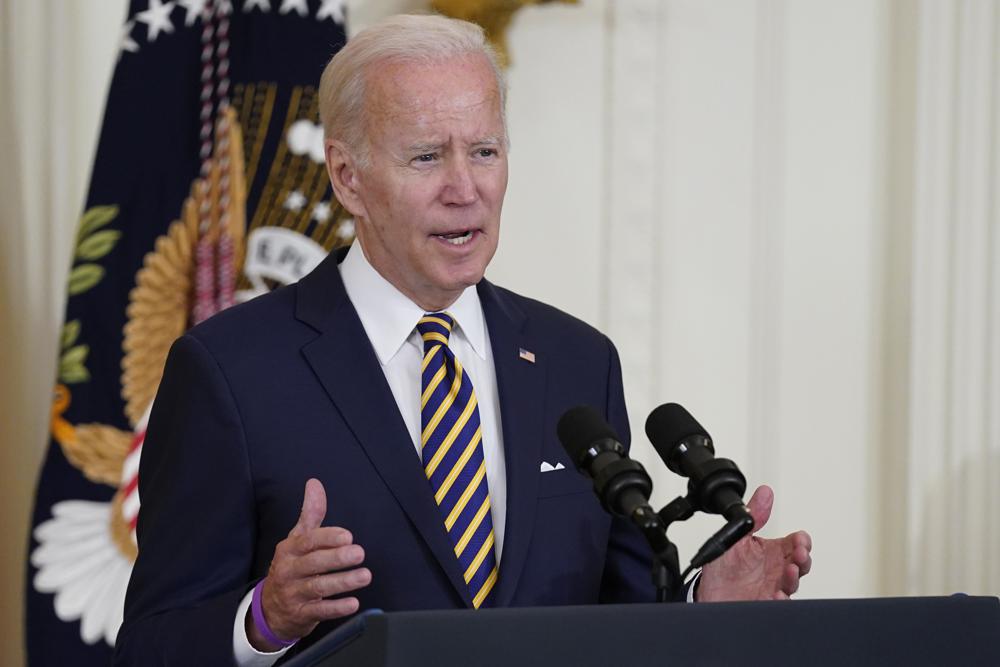
President Joe Biden on Wednesday is set to announce his long-delayed move to forgive up to $10,000 in federal student loans for many Americans and extend a pause on payments to January, according to three people familiar with the plan. Biden has faced pressure from liberals to provide broader relief to hard-hit borrowers and from moderates and Republicans questioning the fairness of any widespread forgiveness. The delay in Biden’s decision has only heightened the anticipation for what his own aides acknowledge represents a political no-win situation. The people spoke on the condition of anonymity to discuss Biden’s intended announcement ahead of time. The precise details of Biden’s plan, which will include an income cap limiting the forgiveness to only those earning less than $125,000 a year, were being kept to an unusually small circle within the Biden administration and were still not finalized on the eve of the announcement. Down-to-the-wire decision-making has been a hallmark of the Biden White House, but the particular delay on student loans reflects the vexing challenge confronting him in fulfilling a key campaign promise. The plan would likely eliminate student debt entirely for millions of Americans and wipe away at least half for millions more. The nation’s federal student debt now tops $1.6 trillion after ballooning for years. More than 43 million Americans have federal student debt, with almost a third owing less than $10,000 and more than half owing less than $20,000, according to the latest federal data. The continuation of the pandemic-era payment freeze comes just days before millions of Americans were set to find out when their next student loan bills will be due. This is the closest the administration has come to hitting the end of the payment freeze extension, with the current pause set to end on August 31. Wednesday’s announcement was set for the White House after Biden returns from vacation in Rehoboth Beach, Delaware. The administration had briefly considered higher education schools in the president’s home state for a larger reveal but scaled back their plans. Biden was initially skeptical of student loan debt cancellation as he faced off against more progressive Sens. Elizabeth Warren, D-Mass., and Bernie Sanders, I-Vt., who had proposed cancellations of $50,000 or more during the 2020 primaries. As he tried to shore up support among younger voters and prepare for a general election battle against then-President Donald Trump, Biden unveiled his initial proposal for debt cancellation of $10,000 per borrower, with no mention of an income cap. Biden narrowed his campaign promise in recent months by embracing the income limit as soaring inflation took a political toll and as he aimed to head off political attacks that the cancellation would benefit those with higher take-home pay. But Democrats, from members of congressional leadership to those facing tough re-election bids this November, have pushed the administration to go as broad as possible on debt relief, seeing it in part as a galvanizing issue, particularly for Black and young voters this fall. The frenzied last-minute lobbying continued Tuesday even as Biden remained on his summer vacation. Senate Majority Leader Chuck Schumer, D-N.Y., one of the loudest advocates in recent years for canceling student loan debt, spoke privately on the phone with Biden, imploring the president to forgive as much debt as the administration can, according to a Democrat with knowledge of the call. In his pitch, Schumer argued to Biden that doing so was the right thing to do morally and economically, said the Democrat, who asked for anonymity to describe a private conversation. Inside the administration, officials have discussed since at least early summer forgiving more than $10,000 of student debt for certain categories of borrowers, such as Pell Grant recipients, according to three people with knowledge of the deliberations. That remained one of the final variables being considered by Biden heading into Wednesday’s announcement. Democrats are betting that Biden, who has seen his public approval rating tumble over the last year, can help motivate younger voters to the polls in November with the announcement. Although Biden’s plan is narrower than what he initially proposed during the campaign, “he’ll get a lot of credit for following through on something that he was committed to,” said Celinda Lake, a Democratic pollster who worked with Biden during the 2020 election. She described student debt as a “gateway issue” for younger voters, meaning it affects their views and decisions on housing affordability and career choices. A survey of 18- to 29-year-olds conducted by the Harvard Institute of Politics in March found that 59% of those polled favored debt cancellation of some sort — whether for all borrowers or those most in need — although student loans did not rank high among issues that most concerned people in that age group. Some advocates were already bracing for disappointment. “If the rumors are true, we’ve got a problem,” Derrick Johnson, the president of the NAACP, which has aggressively lobbied Biden to take bolder action, said Tuesday. He emphasized that Black students face higher debut burdens than white students. “President Biden’s decision on student debt cannot become the latest example of a policy that has left Black people — especially Black women — behind,” he said. “This is not how you treat Black voters who turned out in record numbers and provided 90% of their vote to once again save democracy in 2020.” John Della Volpe, who worked as a consultant on Biden’s campaign and is the director of polling at the Harvard Kennedy School Institute of Politics, said the particulars of Biden’s announcement were less important than the decision itself. “It’s about trust in politics, in government, in our system. It’s also about trust in the individual, which in this case is President Biden.” Combined with fears about expanding abortion restrictions and Trump’s reemergence on the political scene, Della Volpe said student debt forgiveness “adds an additional tailwind to an already improving position with young people.” Republicans, meanwhile, see only political upside if Biden pursues a large-scale cancellation of student debt ahead
Tommy Tuberville joins other leaders to change sexual assault investigations in the military
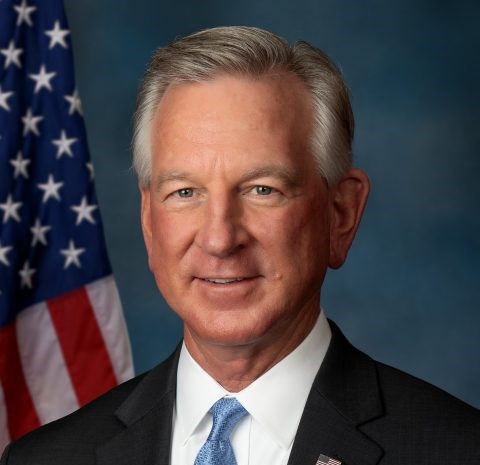
U.S. Senator Tommy Tuberville has joined a bipartisan group of senators to support a bill that will change the way the military conducts sexual assault investigations and prosecutions. Tuberville, a member of the Senate Armed Services Committee Subcommittee on Personnel, joined U.S. Senators Kirsten Gillibrand (D-NY), Chuck Grassley (R-IA), Joni Ernst (R-IA), Richard Blumenthal (D-CT), Ted Cruz (R-TX), Jeanne Shaheen (D-NH), Mark Kelly (D-AZ), and 28 other Senators to introduce the Military Justice Improvement and Increasing Prevention Act. According to the press release, the legislation “keeps the prosecution of sexual assault crimes within the military but moves the decision to prosecute to independent, trained, professional military prosecutors, and provides for several new prevention provisions such as better training for commanders and increased physical security measures, while ensuring that commanders still have the ability to provide strong leadership and ensure a successful command climate.” Tuberville stated, “Our men and women in uniform sacrifice every day to keep us safe, often working in some pretty unsafe places around the world. The last thing they should be worrying about is whether they’re unsafe within their ranks, and they certainly shouldn’t have to fear retaliation if they report a sexual assault. This bill is what happens when a bipartisan group of senators come together to get something done. I’m thankful that Senator Gillibrand and Senator Ernst have led the charge, and I’m glad to join my colleagues in support of this bill that will help improve the way the military handles sexual assaults so survivors can get the justice they deserve.” The bill was introduced in 2019, but did not receive a vote. Specifically, the legislation would: Move the decision on whether to prosecute serious crimes to independent, trained, and professional military prosecutors, while leaving misdemeanors and uniquely military crimes within the chain of command. Ensure the Department of Defense supports criminal investigators and military prosecutors through the development of unique skills needed to properly handle investigations and cases related to sexual assault and domestic violence. Require the Secretary of Defense to survey and improve the physical security of military installations– including locks, security cameras, and other passive security measures – to increase safety in lodging and living spaces for service members. Increase, and improve training and education on military sexual assault throughout our armed services. Kirsten Gillibrand stated on Twitter, “Here’s a bipartisan mission we can all support: Survivors of military sexual assault deserve justice. I’m proud to have @JoniErnst join me this week to introduce our new, improved bill to reform the military justice system and invest in prevention.” Here’s a bipartisan mission we can all support: Survivors of military sexual assault deserve justice. I’m proud to have @joniernst join me this week to introduce our new, improved bill to reform the military justice system and invest in prevention. https://t.co/pYYUL6IRyA — Kirsten Gillibrand (@SenGillibrand) April 27, 2021 The legislation is cosponsored by U.S. Senators Kirsten Gillibrand (D-NY), Chuck Grassley (R-IA), Joni Ernst (R-IA), Richard Blumenthal (D-CT), Ted Cruz (R-TX), Jeanne Shaheen (D-NH), Tammy Baldwin (D-WI), Chris Van Hollen (D-MD), Angus King (I-ME), Michael Braun (R-IN), Dick Durbin (D-IL), Tammy Duckworth (D-IL), Michael Bennet (D-CO), Rand Paul (R-KY), Chris Coons (D-DE), Mark Kelly (D-AZ), Sherrod Brown (D-OH), Bob Casey Jr. (D-PA), Maggie Hassan (D-NH), Mazie K. Hirono (D-HI), Amy Klobuchar (D-MN), Patrick Leahy (D-VT),Elizabeth Warren (D-MA), Ron Wyden (D-OR), Cynthia Lummis (R-WY), Dianne Feinstein (D-CA), Catherine Cortez Masto (D-NV), Raphael Warnock (D-GA), Alex Padilla (D-CA), Shelley Moore Capito (R-WV), Gary C. Peters (D-MI), Tim Kaine (D-VA), Tina Smith (D-MN), Bob Menendez (D-NJ), and Martin Heinrich (D-NM).
Joe Biden faces questions about commitment to minimum wage hike
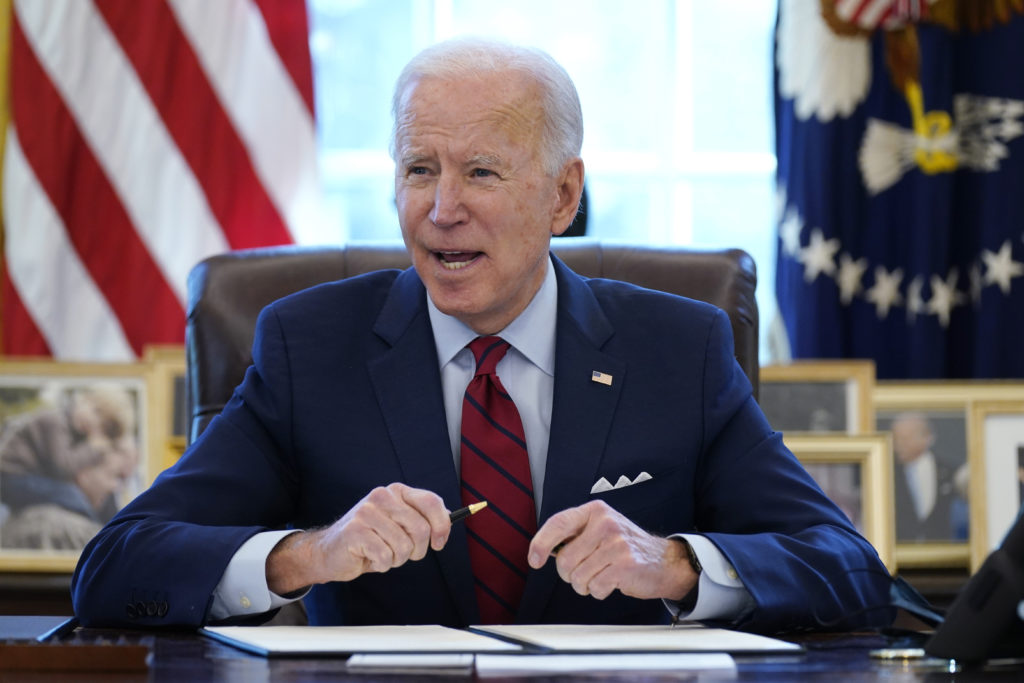
Union activist Terrence Wise recalls being laughed at when he began pushing for a national $15 per hour minimum wage almost a decade ago. Nearly a year into the pandemic, the idea isn’t so funny. The coronavirus has renewed focus on challenges facing hourly employees who have continued working in grocery stores, gas stations, and other in-person locations even as much of the workforce has shifted to virtual environments. President Joe Biden has responded by including a provision in the massive pandemic relief bill that would more than double the minimum wage from the current $7.25 to $15 per hour. But the effort is facing an unexpected roadblock: Biden himself. The president has seemingly undermined the push to raise the minimum wage by acknowledging its dim prospects in Congress, where it faces political opposition and procedural hurdles. That’s frustrating to activists like Wise, who worry their victory is being snatched away at the last minute despite an administration that’s otherwise an outspoken ally. “To have it this close on the doorstep, they need to get it done,” said Wise, a 41-year-old department manager at a McDonald’s in Kansas City and a national leader of Fight for 15, an organized labor movement. “They need to feel the pressure.” The minimum wage debate highlights one of the central tensions emerging in the early days of Biden’s presidency. He won the White House with pledges to respond to the pandemic with a barrage of liberal policy proposals. But as a 36-year veteran of the Senate, Biden is particularly attuned to the political dynamics on Capitol Hill and can be blunt in his assessments. “I don’t think it’s going to survive,” Biden recently told CBS News, referring to the minimum wage hike. There’s a certain political realism in Biden’s remark. With the Senate evenly divided, the proposal doesn’t have the 60 votes needed to make it to the floor on its own. Democrats could use an arcane budgetary procedure that would attach the minimum wage to the pandemic response bill and allow it to pass with a simple majority vote. But even that’s not easy. Some moderate Democratic senators, including Joe Manchin of West Virginia and Krysten Sinema of Arizona, have expressed either outright opposition to the hike or said it shouldn’t be included in the pandemic legislation. The Senate’s parliamentarian may further complicate things with a ruling that the minimum wage measure can’t be included in the pandemic bill. For now, the measure’s most progressive Senate backers aren’t openly pressuring Biden to step up his campaign for a higher minimum wage. Bernie Sanders, the chair of the Senate Budget Committee, has said he’s largely focused on winning approval from the parliamentarian to tack the provision onto the pandemic bill. Sen. Elizabeth Warren, who like Sanders challenged Biden from the left for the Democratic nomination, has only tweeted that Democrats should “right this wrong.” Some activists, however, are encouraging Biden to be more aggressive. The Rev. Dr. William J. Barber II, the co-chair of the Poor People’s Campaign, said Biden has a “mandate” to ensure the minimum wage increases, noting that minority Americans were “the first to go back to jobs, first to get infected, first to get sick, first to die” during the pandemic. “We cannot be the last to get relief and the last to get treated and paid properly,” Barber said. The federal minimum wage hasn’t been raised since 2009, the longest stretch without an increase since its creation in 1938. When adjusted for inflation, the purchasing power of the current $7.25 wage has declined more than a dollar in the last 11-plus years. Democrats have long promised an increase — support for a $15 minimum wage was including in the party’s 2016 political platform — but haven’t delivered. Supporters say the coronavirus has made a higher minimum wage all the more urgent since workers earning it are disproportionately people of color. The liberal Economic Policy Institute found that more than 19% of Hispanic workers and more than 14% of Black workers earned hourly wages that kept them below federal poverty guidelines in 2017. Blacks, Hispanics, and Native Americans in the U.S. also have rates of hospitalization and death from COVID-19 that are two to four times higher than for whites, according to the Centers for Disease Control and Prevention. People of color are a vital part Biden’s constituency, constituting 38% of his support in November’s election, according to AP VoteCast, a nationwide survey of the electorate. Adrianne Shropshire, executive director of BlackPAC, noted that Biden has promised to address racial inequalities and create a more fair economy. That means he now has a chance to ensure that hourly wage earners “come out of this pandemic in better shape than they went into it.” “The recovery around COVID shouldn’t just be about how to stabilize and get people back to zero,” Shropshire said. “It should be about how do we create opportunities to move people beyond where they were.” The White House says Biden isn’t giving up on the issue. His comments to CBS, according to an aide, reflected his own evaluation of where the parliamentarian would rule based on his decades of experience in the Senate dealing with similar negotiations. Biden suggested in the same interview that he’s prepared to engage in a “separate negotiation” on raising the minimum wage, but White House press secretary Jen Psaki offered no further details on the future of the proposal if it is in fact cut from the final coronavirus aid bill. One option could be forcing passage by having Vice President Kamala Harris, as the Senate’s presiding officer, overrule the parliamentarian. But Psaki was clear in opposing that: “Our view is that the parliamentarian is who is chosen, typically, to make a decision in a nonpartisan manner.” Navin Nayak, executive director of the Center for American Progress Action Fund, the political arm of the progressive think tank, said he wasn’t surprised at Biden’s assessment, but still feels the White House is
Dan Sutter: Will student loans be forgiven?

November’s elections imply we will likely see some Federal student loans forgiven. Current student debt levels reflect the morphing of a reasonable program. Loan forgiveness may produce significant changes for higher education. President-elect Joe Biden has indicated a willingness to forgive $10,000 in loans per borrower via executive order. A Democratic Senate will likely result in Congressional action; Senators Charles Schumer and Elizabeth Warren want $50,000 in loans forgiven. Cancellation of all loans may now be a possibility. Before considering the consequences of loan forgiveness, let’s consider why government should make student loans. America has long been described as the “Land of Opportunity,” and as Arthur Brooks argues, Americans accept unequal economic outcomes more readily than Europeans. Many accept unequal outcomes because they believe people have a chance to succeed based on their own efforts. Free enterprise has generated enormous prosperity but also wealth disparities. A rising tide does lift all boats. The Fraser Institute’s Economic Freedom of the World finds that the incomes of the poorest ten percent are eight times higher in the most economically free nations than in the least economically free nations. Free markets also produce billionaires. Inequality has become a topic of intense debate. Resentment of the rich could lead to high income and wealth taxes which would significantly reduce economic freedom. Widespread belief in equality of opportunity short-circuits the politics of envy. Education, including college, has long been an element of American opportunity. College is seen as a gateway to the middle class. The Bureau of Labor Statistics reports that persons with bachelor’s degrees earn 65 percent more than those with only a high school diploma, a lifetime difference of $1 million. This difference in earnings explains why financial institutions would make college loans without government guarantees. Market-based loans would favor students: with stronger academic credentials; pursuing higher-paying degrees; and with assets for collateral (e.g., well-off parents). Libertarian professors might contend that a market for loans provides opportunity, while liberal professors might judge America inherently unfair. The perceptions of an opportunity society that matter politically are those of Americans, not professors. To dig into these perceptions, imagine we could design an unbiased test predicting success in college very well. Suppose we administered this test to high school juniors one time and banned anyone scoring below a given threshold from attending college. Does this sound fair? Such a system, I suspect, would strike many of us as somehow un-American. We celebrate the rags-to-riches stories or the football walk-on who ends up being an All-American. We value the opportunity to try even when the experts tell us we will fail. Market-based loans must offer reasonable returns to attract investors. Yet ensuring opportunity involves giving students who are likely to fail an opportunity. Maintaining an opportunity society probably requires some bad loans to marginal students. Government guarantees enable such loans, and I consider investing in maintaining equality of opportunity worthwhile. Unfortunately, the student loan program pays for tuition at expensive private colleges and for graduate and professional degrees. This goes well beyond ensuring basic opportunity and means loan forgiveness will benefit the well-off. Households in the top 20 percent of the income distribution hold $3 of loans for every $1 held by the bottom 20 percent. A quarter of students graduate college without debt, often because they worked or started at a community college. Forgiving outstanding loans might make current students expect their loans to be forgiven too. This would essentially usher in free college. Yet even government money is not free, and programs typically have mechanisms containing spending. For instance, the U.S. Department of Agriculture supports selected crop prices but limits the eligible acreage. Washington’s financial support of higher education has to date involved few cost-control measures; loan forgiveness may provoke such controls. Student loans reflect a familiar pattern. A reasonable rationale for a limited program provides cover for profligate spending. The problems caused by not limiting access to government subsidized loans may now cost taxpayers, and especially responsible student borrowers, billions. Daniel Sutter is the Charles G. Koch Professor of Economics with the Manuel H. Johnson Center for Political Economy at Troy University and host of Econversations on TrojanVision. The opinions expressed in this column are the author’s and do not necessarily reflect the views of Troy University.
Political fight brewing over Joe Biden’s White House budget chief nominee
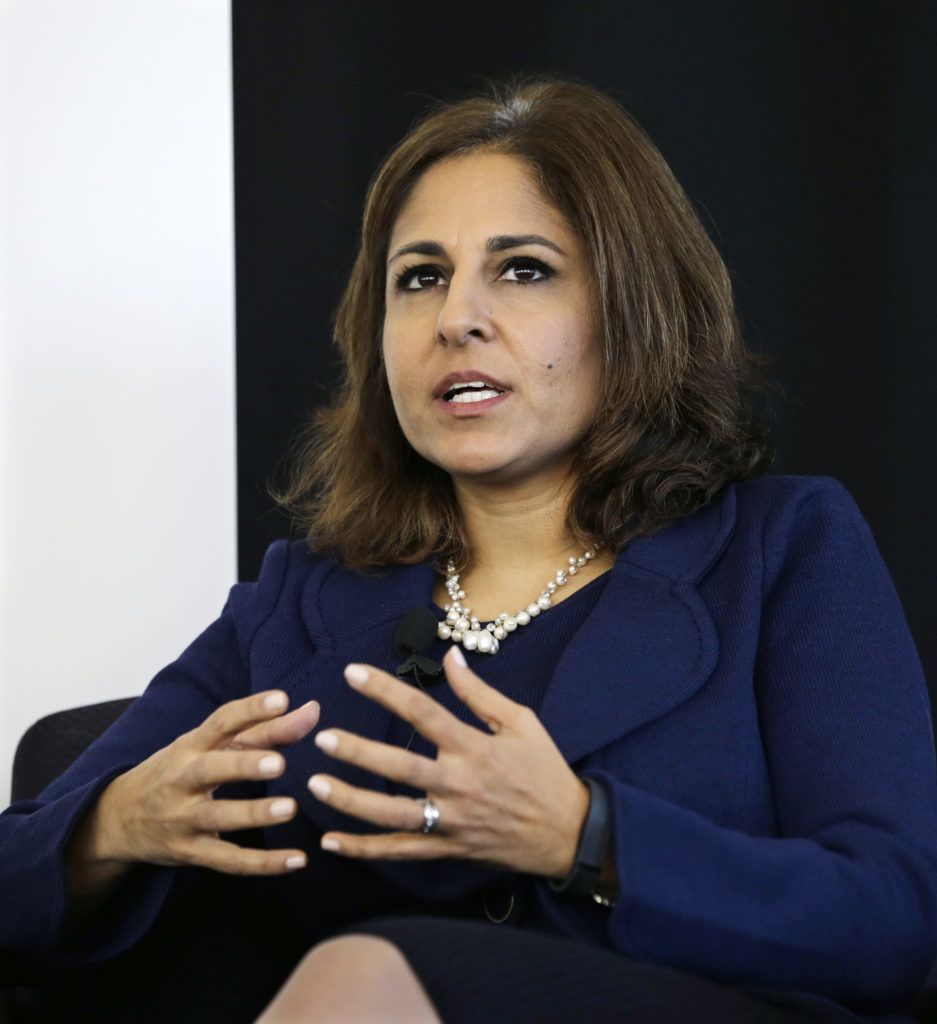
President-elect Joe Biden’s pick to lead the Office of Management and Budget is quickly emerging as a political battle that could disrupt his efforts to swiftly fill out his administration. Some Republicans are expressing doubt that Neera Tanden could be confirmed by the Senate after she spent years attacking GOP lawmakers on social media — and many panned the choice. Arkansas Republican Sen. Tom Cotton claimed Tanden’s rhetoric was “Filled with hate & guided by the woke left.” Texas Republican Sen. John Cornyn said Tanden’s “combative and insulting comments” about Republican senators created “certainly a problematic path.” He called her “maybe (Biden’s) worst nominee so far” and “radioactive.” Potential Budget Committee Chair Lindsey Graham, R-S.C., was less hostile, telling reporters, “Let’s see what happens.” Moderate Susan Collins, R-Maine, a target of Tanden’s, said, “I do not know her or much about her, but I’ve heard she’s a very prolific user of Twitter.” Such sentiment is notable considering the GOP’s general reluctance to criticize President Donald Trump’s broadsides on Twitter. But like all of Biden’s nominees, Tanden has little margin for error as she faces confirmation in a closely divided Senate. That could be especially daunting for Tanden, the former adviser to Hillary Clinton and the president of the center-left Center for American Progress, given her history of political combat. Biden’s transition team released a litany of praise for Tanden from figures including Sen. Elizabeth Warren of Massachusetts and former Georgia gubernatorial candidate Stacey Abrams. Other Democrats also rushed to defend Tanden’s nomination. Former Obama aide Valerie Jarrett said Tanden “grew up on welfare and lived in public housing. She experienced first hand the importance of our social programs. Her extraordinary career has been devoted to improving opportunities for working families. She is an excellent choice to lead OMB.” “Neera Tanden is smart, experienced, and qualified for the position of OMB Director,” added Ohio Sen. Sherrod Brown, a member of the party’s progressive wing. “The American people decisively voted for change – Mitch McConnell shouldn’t block us from having a functioning government that gets to work for the people we serve.” On the Senate floor, Democratic leader Chuck Schumer said it’s impossible to take Republicans’ criticism of Tanden seriously. “Honestly, the hypocrisy is astounding. If Republicans are concerned about criticism on Twitter, their complaints are better directed at President Trump,” Schumer said. At OMB, Tanden would be responsible for preparing Biden’s budget submission and would command several hundred budget analysts, economists, and policy advisers with deep knowledge of the inner workings of the government. If Democrats should win runoff elections for Georgia’s two GOP-held Senate seats, Tanden’s job would become hugely important because the party would gain a slim majority in the chamber. That would allow them to pass special budget legislation that could roll back Trump’s tax cuts, boost the Affordable Care Act, and pursue other spending goals. OMB would have a central role in such legislation. Top Democrats, Biden included, supported anti-deficit packages earlier in their careers, but the party has since changed. Biden was a force behind the establishment of the Obama deficit commission, which was created to win votes of Democratic moderates to pass an increase in the government’s borrowing cap and was chaired by former Clinton White House chief of staff Erskine Bowles. Tanden shares a commonly held view among Democratic lawmakers that Republicans usually profess concerns about deficits only when Democrats are in power, pointing to tax cut packages passed in the opening year of Trump’s administration and former President George W. Bush’s 2001 tax cut. Republished with the permission of the Associated Press.


